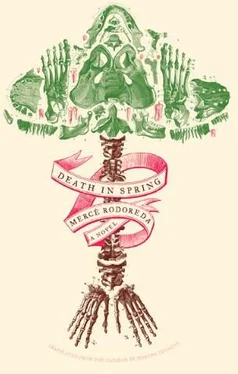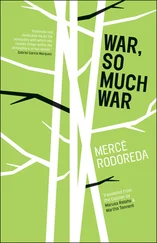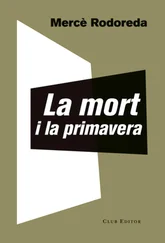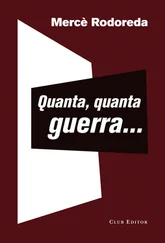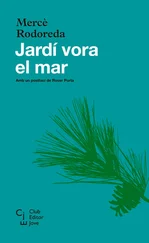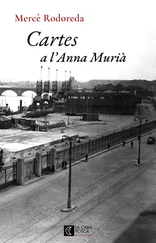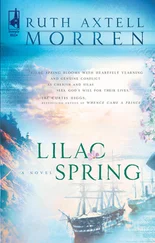Merce Rodoreda - Death in Spring
Здесь есть возможность читать онлайн «Merce Rodoreda - Death in Spring» весь текст электронной книги совершенно бесплатно (целиком полную версию без сокращений). В некоторых случаях можно слушать аудио, скачать через торрент в формате fb2 и присутствует краткое содержание. Год выпуска: 2009, Издательство: Open Letter, Жанр: Современная проза, на английском языке. Описание произведения, (предисловие) а так же отзывы посетителей доступны на портале библиотеки ЛибКат.
- Название:Death in Spring
- Автор:
- Издательство:Open Letter
- Жанр:
- Год:2009
- ISBN:нет данных
- Рейтинг книги:4 / 5. Голосов: 1
-
Избранное:Добавить в избранное
- Отзывы:
-
Ваша оценка:
- 80
- 1
- 2
- 3
- 4
- 5
Death in Spring: краткое содержание, описание и аннотация
Предлагаем к чтению аннотацию, описание, краткое содержание или предисловие (зависит от того, что написал сам автор книги «Death in Spring»). Если вы не нашли необходимую информацию о книге — напишите в комментариях, мы постараемся отыскать её.
is one of Mercè Rodoreda's most complex and beautifully constructed works. The novel tells the story of the bizarre and destructive customs of a nameless town — burying the dead in trees after filling their mouths with cement to prevent their soul from escaping, or sending a man to swim in the river that courses underneath the town to discover if they will be washed away by a flood — through the eyes of a fourteen-year-old boy who must come to terms with the rhyme and reason of this ritual violence, and with his wild, child-like, and teenaged stepmother, who becomes his playmate. It is through these rituals, and the developing relationships between the boy and the townspeople, that Rodoreda portrays a fully-articulated, though quite disturbing, society.
The horrific rituals, however, stand in stark contrast to the novel’s stunningly poetic language and lush descriptions. Written over a period of twenty years — after Rodoreda was forced into exile following the Spanish Civi War—
is musical and rhythmic, and truly the work of a writer at the height of her powers.
A book for the ages,
can be read as a metaphor for Franco's Spain (or any oppressed society), or as a mythological quest novel. Rodoreda’s last novel is a bold, ambitious statement, and a fitting capstone to her remarkable career.
Death in Spring — читать онлайн бесплатно полную книгу (весь текст) целиком
Ниже представлен текст книги, разбитый по страницам. Система сохранения места последней прочитанной страницы, позволяет с удобством читать онлайн бесплатно книгу «Death in Spring», без необходимости каждый раз заново искать на чём Вы остановились. Поставьте закладку, и сможете в любой момент перейти на страницу, на которой закончили чтение.
Интервал:
Закладка:
Part Four
I
Many people accompanied me as I prepared to swim under the village. I don’t know who they were; I don’t know if we hurried or dawdled, if they talked or were silent. If I try to recall walking to the wash area, I cannot. I remember turning back and seeing the two women from Font de la Jonquilla in the doorway of the last house in the village, the one with the protruding eyes and the one with the long braid. I remember the sound of water. I don’t know whether it was because of the women or the sound of the river, but I thought about two types of water. One good, one bad. They all wanted it. They had contrived to do it. They were bored and needed it to keep living. Everyone’s face bespoke a craving, although what they wished was not really clear to them; they just wished it at whatever cost. I never realized they had all joined together to do this to me: men, women — even the pregnant women — the old men from the slaughterhouse, the man in charge of blood, the faceless men, all of them incited by the blacksmith. The Festa was late that year because of the fighting and because the villagers needed time to lick their wounds. I remember the heat, appearing suddenly out of nowhere, I can still feel it, and the strong light that was like a summer light when summer blinds. It returns and furrows into the unease of now, which isn’t really unease, I don’t know what it is. The heat beats against the rose-colored walls of the houses and reflects onto me, blinding me. I think endlessly about my life and feel that it is dying. The broad river flowed past, covering the banks, flattening the grass. It carried away earth and stones whose edges had been polished by the years. Joyful mornings still exist, but where I can’t say. Amidst the canes, perhaps, in the wind rustling through leaves, in the wing feathers of mourners as they circle Muntanyes Morades but never venture to Maraldina. Everyone was in the Plaça. Dark smudges marked the tree — and the ground beneath it — where the man had hung by his feet for three days. The two old men who held up the stake-laden trunk seemed wooden, their fingers full of tree nodes rather than knots. I should have told them to leave, or grabbed them by the collar and choked them. It seemed like years since the day I took my child to Font de la Jonquilla, but in reality only a short time had passed. My life had been filled with the struggle of growing, the kind of death my father endured, everything he did to me, everything that happened round me. Life had turned ugly from so much living. This never-ending chain of men and women coming together, children never ceasing to be born. My mother had been beautiful, and then one day, without knowing what had happened, she turned ugly. Everyone was in the Plaça, and the race had finished. The moment had come to swim the river. I looked up. The window in Senyor’s house was closed; the ivy was sending up sprouts that stretched upward as far as the windowsill. The pregnant women, with only the lower part of their faces showing, were sitting in the Plaça under the shade of the trees. My wife had climbed up on a branch and was observing it all as she swung her hard-soled feet back and forth high above the ground. The blacksmith’s son had spent hours lying on the spot where the prisoner’s cage had stood. The aftermath of the clash was apparent: fewer men in the village, dark smudges on the tree, burnt houses being rebuilt.
When I drew the forked stick, which was practically placed in my hand, the pregnant women raised their heads and laughed out of the corners of their mouths. While still in the Plaça, an old man said, drink. The drink they forced on me burnt my throat, my entire body, as it went down. The blacksmith came over to me, slapped me on the back a few times and said, don’t be afraid. I don’t know who accompanied me. I can visualize the two women from Font de la Jonquilla standing motionless, their eyes fixed on me; for a long time I could feel their gaze on my back, at once a burden and a companion. I remember the blacksmith; he was with the others who accompanied me. He walked beside me. A child holding a cane appeared out of nowhere and drew a line on the ground, shouting with his hands in the air that we couldn’t cross it. We stepped on it, the broken line through which things escape when you are little, broken from within, the break through which everything escapes. I can’t see the blacksmith, but I see his mouth — lips the color of crimson powder, teeth rotten, eyes that never looked but always saw. The child who had drawn the line was standing in the middle of the street; I saw him again the last time I turned round. We reached the river, right at water level. I didn’t strip. I approached the edge of the river without knowing why I was there. My mouth filled with the strong taste of the drink, a wave of blood in my forehead, throbbing and throbbing. The blacksmith removed my clothes. I’ll have to take care of you. He took my clothes off slowly, blocking the sun. Standing beside the water, my back to everyone, I felt as if I were more insignificant than the thing I was before I was born. A large hand gave me a shove on the head. Before I fell into the water, I had a glimpse of the blacksmith’s son facing me from the other side of the river.
II
I felt as if I was water and my body of flesh and bones had stayed on land with my clothes. The water pulled me under. As I had neither hands nor legs, at first the water drew me down. The drink did not calm my fear: it numbed my arms and legs. When I emerged from the glass darkness, I still carried the afternoon glare with me and I could see nothing. Then the shadows split; just as I felt that all was lost, a rock stopped me. I grabbed hold of it and my legs and arms seemed to come alive again. It occurred to me that perhaps the drink only numbed you at the beginning. I caught the strong smell of moss, and the rock beneath my hand was viscous, snot-like. My father’s hand was large, covered with hairs, the dry skin cracked, a white half-moon at the base of his fingernails. When I was little my father was a hand. A hand behind my head, pushing me forward, grow up fast, you’re a nuisance. If I was in the dining room, he pushed me into the courtyard; if I was in the courtyard, he pushed me toward the dining room. My mother said my father was changing, becoming strange. He would leave and we wouldn’t see him for two or three days. He would return and act like he always had, but he stayed away longer each time. That’s when my mother began her plaintive keening beneath the windows of newlyweds. She grew full of rage, sometimes whimpering and groaning, we won’t ever see him again. He always returned, but I fretted over the idea that he might not, and I would sit and listen behind the door, my back nailed to the wood. In the end, every time my father reappeared, my mother would tell him that it would be better if he never came back. Let him leave and not come back, let him leave and not come back. My back to the door, sleepless, listening to the sounds from the street, I would whisper in a low voice, don’t come back, don’t come back. He started saying he wanted to kill himself, he was going to kill himself and we would never see him again, one day we would wait for him and never see him again. He looked at us and said he would kill himself, and when he killed himself he would laugh thinking we would be waiting for him but would never again see him. And then my mother grew ugly. The water was freezing. With the hand that wasn’t holding tight, I touched the rock. At first I was repulsed, but then I liked it; I could feel it against my back, darkness streaming out of the rock. He would say, in order to survive, you have to live as if you are dead. He said it as if he weren’t addressing anyone, while my stepmother sat on top of the table stringing flowers, one after the other. When my stepmother first came home with us, she began to change and my mother said. No, that was before my stepmother arrived, when my father first began to say he wanted to kill himself. When my stepmother appeared, my mother was already dead, I think. Yes, my mother was already dead. I realized during the early days with my stepmother that father had changed; he was the man he had been years before: he would come home happy, his eyes glowing. Later, his face always showed the same thing. It never changed, and he entered the house slowly. When my mother died, he told me that in order to survive you have to live as if you are dead. The following day I crossed the river with the bee chasing me; I wanted to visit the tree cemetery I had never seen. My father had grown thin; he said he couldn’t sleep, on certain nights the lifeless gash on his forehead seemed alive. He had grown thin and the tree was consuming him, as darkness was consuming me. I rubbed my hand over the slimy rock, again and again. The water created fat waves against the rock and I swayed back and forth. I felt there was no time; Time, I mean, was not present. It merely created light and change. I wanted to move, wanted to cross to the other side of the rock to see if. And while I was thinking about the “if,” a huge wave crashed against me and swept me away. Like a tiny particle I floated downstream until something blocked me and my feet got entangled. The smell of moss was settling in my nose, stronger than before. I wanted to disengage my feet from the reeds, but I couldn’t. The harder I tried to loosen them, the stronger they clasped me. Something horrible grew in my chest, as if a lump that held the fear of life, fear of people, fear of the unknown had formed in the center of my chest. A lump filled with suffering in the center of my chest, secured by root-like nerves. The reeds were binding me tighter and tighter. Like rope. She had told me to make a rope for her. The first winter she was with us. I ignored her. But when my father was dead and I slept at the foot of her door so I could hear her breathing. The river flowed through my bound feet as it circled the earth like a snake wanting to bite its tail. She made me enter the room where she slept with my father. No, my father was already dead. She opened a box and pulled out a rope, saying it was very old, tomorrow you’ll make me a new one. Two of them, many of them. She gave me some hemp and told me I had to make more rope: thin, fat, a lot of rope. Rolled up inside the box, the rope I made her looked like a young snake on top of an old snake. Beneath it lay the rope that was her mother and the awl that was used on me when I was little. When we were going to have the child, she clawed me, made my cheek bleed, told me that no one had ever made her a child. When she heard me enter the house, she hid; if I called to her, she fled and sometimes didn’t come back all night. She would go and watch the man with the cudgel fighting with the village boys. She would watch from her hiding place, hear the shrill sound he made with his tongue, the things he said and she couldn’t understand. When the old man entered the cave, leaving a boy lying unconscious on the ground, she would come out of her hiding place in the grass and kick the boy in the ribs. My legs were trapped, and I was enveloped by darkness, the whole village above me, a group of men waiting for me to emerge. I would have stayed there, among the reeds, with the cold water. I was thirsty and sick. I drank some water and was thirstier still because the thirst was born deep within me, beneath the lump in my chest, and the water couldn’t reach it. My tongue was thick; the taste from the drink had grown stronger, and my mouth was salty and sour. I ran my tongue over my teeth, finding everywhere the taste that grew and grew, changing from salty and sour to bitter. I touched my teeth and glassy eyes without understanding that I was doing it. As if, without my realizing, some other person wanted to touch my eyes to see if the slime was on my teeth, in my eyes, on the rocks dashed by the water as it surged from inside the earth. Darkness emerged thick, as if night— the night I carried within me, that no one could dislodge — were gushing from the rocks. I moved a leg, and the reeds that bound me seemed less strong. I grabbed hold of something and leaned down, how cold, and severed many of the reeds, some were stubborn, some decomposing. Little by little, I constructed a well of water without reeds around me, and when I was on the verge of being able to escape from that prison, I didn’t. I saw my child and the blacksmith’s son. I saw them the first time I crossed the river, not alone but with my child in the patch of dog roses, spider webs stuck to her leg, she had said, get it off, get it off. you knew it, you knew it, you knew it. With an effort I disentangled myself from the reeds, though some of them still wished to grasp me. Again, Time, and no way of knowing if I had been among the reeds very long, the water and me beneath the village, all of me on fire, the cold water carrying me along. I stretched out an arm and found a branch to clasp, it was a root, coming from above, the roots that upwrenched houses were dry, and some, wishing to drink, had come in search of the water that flowed beneath them. I tightened my hand round the root, as if it were a friend, as if it were the prisoner’s hand waiting for me ever since that night because he had been able to escape his suffering when I had shouted that the village was burning. I felt my head becoming clearer; I was again becoming me, with arms and legs that could swim and walk. Everything was darker near the root. Darker than all the darkness I had left behind. The rock wall was slimy, the moss grass-like; I followed the course of the water with my hands as it combed the moss, flattening it. This rock was slimier than the other, as if all the snails, all the slugs had deposited their mucus and foam on it. The rock was a snakeskin, and snake and water were one and the same, and the river of the dead killed whoever swam beneath the village. As if suddenly awakening, I felt an obstacle approaching. An obstacle and an odor. I stopped breathing, as if the thing lived only in my head, as if I could kill it by holding my breath. It and the smell were approaching, closer and closer. I glimpsed a darker shadow within the blackness and a faint gleam. Out of fear of the thing approaching with its breath, I loosened my grasp on the root, and the water swept me away, leaving the malodor behind; again, I found my arms and legs numb. I cried out, as if someone could hear me and come to my aid. I was alone, and the rock crushed my forehead, many sharp-edged rocks slashing me at the same time. The whole ceiling had lowered, water and ceiling meeting, or the river had risen. A mouthful of water was mixed with the taste of blood. The water deposited me on top of a rock. Whether I rested there for a short time or longer, life had ended. My innards burned, and I was surrounded by freezing water. I could hear water surging, a waterfall, I thought. Only water, the flowing water, and my aching forehead, everything was moving, the river widening, the ceiling rising as if it were made of resin that the water could erase. I had only to wait. The rock was warm. I was dead, and Time did not exist. I could feel a breath-like warmth entering my body. I moved my hand away and reached toward my sleeping father’s mouth, when he breathed out, I moved my hand away, my father had fallen asleep in the courtyard, seated in a chair, early one afternoon. The gash on his head was recent, and I wanted to look at his eyes, know if he could see me through the slit in his eyes, even though he was asleep. I tiptoed over to him, leaned down to gaze into his eyes. He was sleeping, and the bit of eye that was left open was staring. I placed my open hand in front of his eyes. He didn’t budge. He seemed to see me, but didn’t. He was breathing deeply, and a rattle rose from his throat. I waved my open palm before his eyes, then held my hand in front of his mouth; his breath was warm as it came and went. One night, shortly thereafter, I saw. I saw it in my sleep but I was awake, on the real day, in the courtyard, there was a green brightness, and my mother’s blue apron lay on the table, and that night I noticed that the light in the courtyard was also green and the apron on the table, blue. Afternoon and night merged. My father was reclining in the same chair in the center of the courtyard, but fog circled his feet, round his legs. I wanted to look at his eyes. I was just as frightened as that afternoon. Frightened that he might see me, frightened he might wake up. Again, I waved my hand before his eyes, he didn’t seem to see me, even though the slit in his eye was shining. When I was tired of leaning over to look in his eyes, I placed my open hand in front of his mouth, and while I was doing that, I thought about the fog that enveloped his legs, but I didn’t dare look at it. I was thinking about the fog when I had to jerk my hand away because the breath escaping my father’s mouth was fiery hot. I glanced down at my stinging palm. It was scarlet and large, like the palms of the man with the cudgel; I backed away, but my father’s burning breath still reached me, like a scorching wind. I kept changing places, moving about the courtyard, my father’s chair spinning round as if its four legs were not fixed to the ground, his breath following me, hotter and hotter. I don’t know how I managed to get to the dining room; from there everything seemed far away. I went upstairs and lay on the bed, my heart pounding. I shut the door. I think I was falling asleep, I don’t remember a thing. I couldn’t see the door because it was at the head of the bed. I couldn’t see it. Without seeing the door, which lay just behind my head, I observed a ring of fire in front of me, at the foot of the bed. Ember red. A black ring began to form near it. The smell of burning wood didn’t reach me until the black ring had formed. I was unable to think why I was seeing what I was seeing and shouldn’t be. A hole formed in the center of the embers, and the embers closest to the hole were surrounded by ashes. As the black ring widened, the embers followed it and the hole grew larger. My father’s mouth appeared in the center of the hole, his breath burning the door. When I realized that the door behind me now lay before me, at the foot of the bed, and that my father would begin to burn me, a rattle rose in my throat, the rattle my father had that afternoon in the courtyard. I awoke then, sweating and trembling. I couldn’t keep my hands from shaking or a knot from quickly swelling on my upper arm, as if an animal were living beneath my skin. The stone was warm, like breath. Wanting to know how large the stone was, I tried extending my leg to see if I could reach the edge of it with the tip of my foot, but it was as if I had no legs, only a swelling. The stone was warm, as if a calm stream of hot water were emerging from it. Slimy against my cheek. For a time that was not time, I lay with the cold and heat, a rattle in my throat, on top of the rock, as if I had turned to rock. I looked round and when I wanted to shut my eyes, I couldn’t. During that time when Time did not exist, the pain in my forehead had grown, and groans issued from my mouth of their own accord. I would have liked to touch my pain, know what had happened to my forehead, but I could not raise my arm, and I flattened myself against the rock. I would have stayed there forever, but just as the water had deposited me there, it carried me away. More furious, more enraged, the real thing. It swept me up, swept me away, and when the ceiling was almost upon me, I felt another low ceiling approaching, like the one that had reached down to the water and, again, the water forced me upward, as if offering me to the rock. I felt my forehead being ripped away. My entire forehead. The healed wound on my father’s forehead looked like blood when he raged or when it was very hot. It ripped his forehead off, someone was saying in a low voice as she nursed me.
Читать дальшеИнтервал:
Закладка:
Похожие книги на «Death in Spring»
Представляем Вашему вниманию похожие книги на «Death in Spring» списком для выбора. Мы отобрали схожую по названию и смыслу литературу в надежде предоставить читателям больше вариантов отыскать новые, интересные, ещё непрочитанные произведения.
Обсуждение, отзывы о книге «Death in Spring» и просто собственные мнения читателей. Оставьте ваши комментарии, напишите, что Вы думаете о произведении, его смысле или главных героях. Укажите что конкретно понравилось, а что нет, и почему Вы так считаете.
